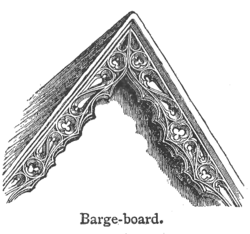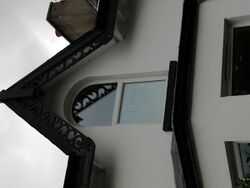Engineering:Bargeboard


A bargeboard or rake fascia is a board fastened to each projecting gable of a roof to give it strength and protection, and to conceal the otherwise exposed end grain of the horizontal timbers or purlins of the roof. The word bargeboard is probably from the Medieval Latin bargus, or barcus, a scaffold, and not from the now obsolete synonym vergeboard.

History
Historically, bargeboards are sometimes moulded only or carved, but as a rule the lower edges were cusped and had tracery in the spandrels besides being otherwise elaborated. An example in Britain was one at Ockwells in Berkshire (built 1446–1465), which was moulded and carved as if it were intended for internal work.[3]
Modern residential rake fascias are typically made of 2-by dimensional lumber, with trim added for decoration and/or weatherproofing later.
See also
References
- ↑ Patton, Marcus (1984). Historic Buildings , Groups of Buildings, Areas of Architectural Importance in Bangor and Groomsport. Belfast: Ulster Architectural Heritage Society (UAHS). "Princetown Road 30–40; ca 1890; Terrace of two-and-a-half-storey stucco houses with frilly barge boards to deep-eaved dormers over ground floor canted bays; ..."
- ↑ “Saitta House – Report Part 1 ”,DykerHeightsCivicAssociation.com
- ↑
 One or more of the preceding sentences incorporates text from a publication now in the public domain: Chisholm, Hugh, ed (1911). "Bargeboard". Encyclopædia Britannica. 3 (11th ed.). Cambridge University Press.
One or more of the preceding sentences incorporates text from a publication now in the public domain: Chisholm, Hugh, ed (1911). "Bargeboard". Encyclopædia Britannica. 3 (11th ed.). Cambridge University Press.
External links
 |
